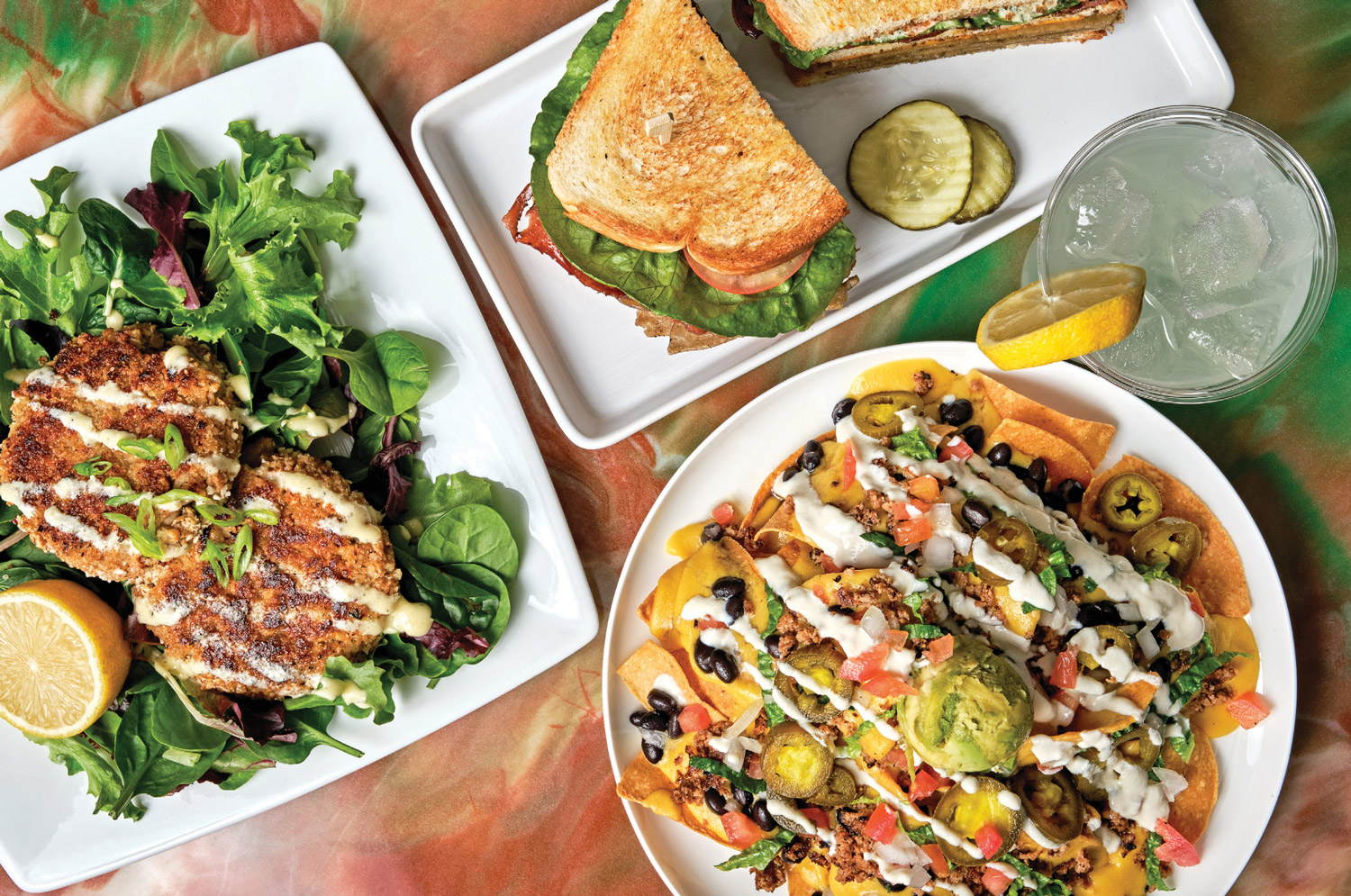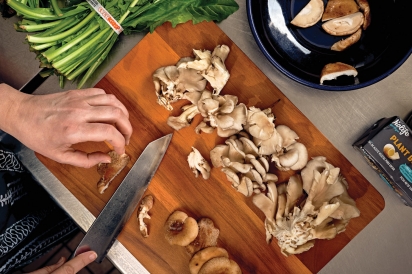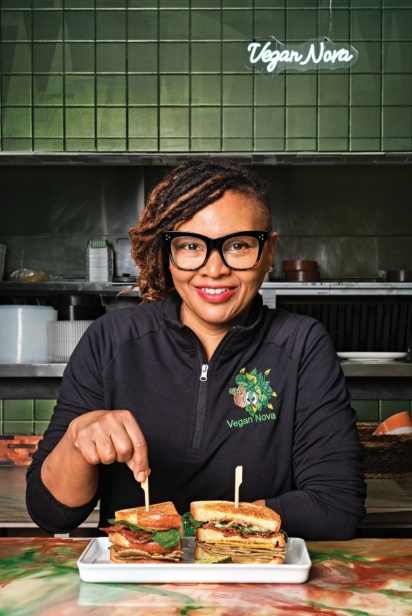Where Have All the Plant-Based Restaurants Gone?
CHRIS PELAK DECIDED to come right out with it. “Here is the unfortunate truth: I will be closing SugarBuzz as it exists now,” he posted on Instagram in late November.
“I didn’t want to let the community down,” he explained recently. “I didn’t want to let our customers down. I didn’t want to let the employees down,” he says, recalling the post and how timing— COVID hit the month after he signed the lease for the Ferndale vegan bakery, delaying opening for a year—and a spike in ingredient costs became just too much. “I wasn’t going to sacrifice my ideals just because the prices were rising.”
Prior to the post, Pelak alerted his employees. His first priority was to stay open long enough for them to find new jobs. He also had to let his wholesale clients know, including Pete LaCombe at the plant-based eatery Chili Mustard Onions.
“I went there one day to deliver desserts and wondered, ‘Should I tell them we’re going to close?’” Pelak recalls. Before he could, LaCombe beat him to the punch, sharing his own decision to close after four years in Detroit’s Brush Park. “They made their announcement and we waited a few weeks to make ours.”
By New Year’s both had closed, leaving Metro Detroit’s vegan community reeling after a year and a half of losing a startling number of popular plant-based eateries and bakeries, including Nosh Pit in Royal Oak, Street Beet popup in Detroit, Vedge Café vegan deli in Ann Arbor and Inn Season Kitchen in Royal Oak, plus the downsizing of Detroit Vegan Soul with the closing of their original location in West Village. Earlier, The Lunch Room Diner & Canteen in Kerrytown closed in 2020, allowing the owners to focus on their remaining locations, including nearby Detroit Street Filling Station.
For many restaurants, the pandemic brought insurmountable debt, staffing shortages, an unreliable supply chain and skyrocketing ingredient costs, each challenging enough for a mainstream restaurant but seemingly worse for vegan businesses that often rely on specialty ingredients.
Thomas Proger is the president of VegMichigan, a nonprofit committed to promoting the benefits of a plant-based diet. He says he has gotten to know some of these restaurateurs pretty well. Individually they’ve shared with him that it’s a combination of those reasons. “They had enough customers, but it was just all the other challenges that made it too much.”
Even VegMichigan feels the effects of the cost increases when filling their 30- day pledge program bags—a selection of plant-based products provided to those who pledge to try to reduce their meat intake—says Noelle Grain, operations manager.
“We have found, just as a nonprofit that doesn’t have access to Sysco and Aramark, it is costly,” says Grain. Certain vegan products aren’t available through standard restaurant suppliers, forcing small businesses to shop retail for ingredients.
Suzy Silvestre, owner of Chive Kitchen in Farmington, analyzes every purchase and understands how current prices could become the last straw for already stretched-to-the-max small businesses.
“Everyone wants to be ‘COVID’s over and it’s great and you survived,’ but we’re still trying,” says Silvestre. “The inflation hit hard and didn’t go away.”
“If you’re a large restaurant, like Olive Garden or even, locally, Andiamo that has a bunch of different locations, you can buy in bulk and get things cheaper,” says Silvestre. Small businesses often don’t have the space or finances to do the same, so have to rely on retail purchases.
Although health-conscious diners are accustomed to paying a premium, it’s gotten out of control, says Silvestre, adding that the Midwest often lacks easy access to some West Coast–made vegan products. She’s thankful that R. Hirt Jr. Co., specialty food distributors in Detroit, started carrying Violife vegan cheese and other items that can be expensive, especially with shipping.
To keep costs down, Silvestre adjusts her menu. She recently paused offering vegan rumchata cake when the cost of Flora butter was so high her pastry chef “began rationing it like gold,” she says. Silvestre also pivoted the business toward more catering, especially weddings, and starting a vegan wine club.
“The pivoting is still happening. It’s every day,” she says, calling it a constant battle for the restaurant she opened in 2015. “Other small businesses are doing the same, and not just vegan ones.”
“Everything falls on your shoulders,” says Silvestre. That takes a toll. “People left the industry during COVID because it’s very physically and mentally draining. I don’t blame them. They took the time off and their bodies felt better. I get it. We have to show up. With carpal tunnel and herniated discs, headaches and hangovers, we still have to show up.”
The fluctuating costs dictate some of what Katie Robinson makes at her Botanical Bakeshop in Milan.
“I’m really good at pivoting,” says Robinson, who opened the mostly wholesale vegan bakery in 2021. Her menu always changes, but more and more it isn’t solely about what’s in season, but also each item’s cost in time and ingredients. That meant pausing her popular chocolate babka sometimes because it’s too labor intensive and she’s not willing to increase her own prices.
“Making food accessible is important to me,” says Robinson. “I know if I keep things simple, I can keep it affordable. There’s a dance I do. I love simple baked goods, in general, but costs are something I’m always thinking about.”
Being primarily wholesale also helps. “I can come and go as I please and I don’t have a retail space I need to staff,” she says, wondering why inflationary effects feel particularly debilitating for vegan businesses.
“Is our pool just that much smaller? Look at the cost of eggs. They’re as high as ever. You don’t see [standard] bakeries closing. My [vegan] butter has gone up $3 a pound. It was $3. Now it’s $6,” she says. The uncertainty makes Robinson cautious about expanding, even though the demand exists. She usually sells out of monthly box offerings within hours, if not minutes.
“I’m really scared to scale,” she says, because rent is low and a move would be more expensive and she’d have to increase her workforce of two employees to afford it. “If labor goes up—that’s justified—but I can’t pay the same for rent.”
Pressures like these fall squarely upon independent, small-business owners, who often have to fill the gaps themselves, says Robinson. “You take on a lot of the grunt work and it just gets exhausting,” she says.
Staffing is the biggest challenge facing Jasmine and Ronnie Raiford, who opened Trap Vegan in Detroit in late 2021.
“When there are so many people hiring, how do you attract a quality workforce?” asks Ronnie. “We keep trying and trying. It’s very challenging. It’s something I never thought we’d have a problem with. We just try our best to navigate through it.”
Named after how Jasmine tested her recipes on family members without telling them they were vegan—so they fell into her “trap”—Trap offers plant-based versions of comfort food classics like burgers and nachos, alongside smoothies and salads. The pair takes pride in hearing “I eat meat, but this is better.”
“There was nowhere to eat a good vegan burger in Northwest Detroit; you’d have to go to Royal Oak or Dearborn,” says Ronnie. “As you learn more, you get wiser about the things that you eat.”
“We just turned something that was a passion, a love, into a business and it worked out,” says Ronnie. “Sometimes you’re successful, sometimes you aren’t. We just thought it was an underserved market—vegans in Detroit.”
Not all the news is bleak. Several new plant-based businesses have emerged in Metro Detroit, providing hope that the course may be steadying. In October, The Lunch Room owners opened North Star Lounge, an all-vegan bar and music venue in Ann Arbor, as well as maintained The Lunch Room outpost and Detroit Street Filling Station. And even though Inn Season Kitchen is gone, its owner is still working toward the return of the iconic Inn Season Café in Royal Oak, closed since the pandemic.
Only a year and a half old, SuperBaked in Southgate, is growing steadily, says owner Melvin Koslowski. The bakery began as half traditional, half vegan, but changed its model about a year in.
“It appeared that 90% of our business was vegan,” says Koslowski, who runs the business with his two adult children. “We’re all plant-based now and we probably have the largest selection of vegan baked goods in the area.”
Top sellers include their Super Bumpy cupcake and Tahini Chocolate Chip Cookie. They’ve also begun to offer several gluten-free vegan options and hint they’ll soon announce other additions. He reiterates that some ingredients have doubled in price and even become hard to find.
“We’re fussy about what plant-based butter we use,” says Koslowski, adding that shipping professional-grade butter is expensive because it needs refrigeration. “We’ve gotta build it out even more to be able to sustain it for the three of us.”
In November, Stephanie Coolidge took the leap from food truck to a brick-and-mortar location in Pontiac for her Vegan Nova. She says business is picking up more and more every day.
Always most comfortable in the kitchen—she calls it her “happy place”— Coolidge started experimenting with making her own vegan dishes after her breast cancer “put a lot of things in perspective.”
“I just wasn’t the same anymore,” says Coolidge. “My main thought was ‘How can I fix my life so this doesn’t come back?’” She became vegan, cold turkey. In 2019, she invested her savings into building out a food truck. Before long her best friend, Shannon Roberson, told her she should get a restaurant.
“That’s how we got the brick-and-mortar,” says Coolidge, adding that Roberson is now a co-owner. It took two months to transform the former Coney Island into an inviting space where, Coolidge hopes, people will want to stay a while. She still plans to run the food truck seasonally.
Everything is vegan and almost all— burgers, potpie, cheesesteak and more— house-made. “We like to say: We offer you great food that just happens to be vegan,” says Coolidge.
Because Nova is family-run, she doesn’t face the staffing issues hitting so many right now.
“My kids are 200% in this with me,” she says, joking that she’s lucky her children don’t mind spending 12 hours a day with her. The business is even named for her granddaughter, Nova.
“Our special ingredient is we put love in everything. We’re very spiritual people. We are definitely each others’ support system,” says Coolidge, adding: “We try to make sure we feel good before we make other people’s food.”
“If your mind isn’t right or your heart isn’t right, the food isn’t right.”
For more information about plant-based diets, options and resources, visit VegMichigan/resources.
Chive Kitchen
33043 Grand River Ave., Farmington
248-516-7144 | chivekitchen.com
Botanical Bakeshop
508 County St., Milan
734-280-7676 | botanicalbakeshop.com
Trap Vegan
20198 Livernois Ave., Detroit
313-340-2988 | trapvegan.com
Super Baked
18714 Eureka Rd., Southgate
734-225-7008 | @superb4ked
Vegan Nova
760 E. Walton Blvd., Pontiac
844-VEG-NOVA | thevegannova.com
Shades of Green
Like the restrictions themselves, dietary monikers today cover an array of meanings. Here’s a brief glossary on the vegan-to-omnivore nomenclature.
Vegetarian
Vegetarians rely on vegetables, fruits, grains and nuts. They do not eat meat—no beef, poultry, pork or fish. Many choose to be lacto-ovo (or ovo-lacto) vegetarians, which means that although they don’t eat animals, they do eat products that come from animals, such as dairy and eggs.
Vegan
Vegans are similar to vegetarians, but stricter because they also avoid foods that originated from an animal, including dairy, eggs and honey.
Flexitarian
A flexitarian is someone who usually follows a meatless diet, but will occasionally eat meat or fish.
Plant-Based or Plant-Focused
A slightly looser, perhaps less committed vegetarian, this is someone who follows a diet of products derived from plants, but may sometimes eat meat, dairy and eggs. The somewhat more modern term usually denotes someone who adopts a diet for health reasons rather than ethical ones.
Omnivore
An omnivore eats both animals and vegetables.
Pescatarian
A vegetarian who also consumes fish.
Raw Veganism
A vegan who avoids eating food that has been heated above 118°F, because they believe cooking destroys valuable nutrients and enzymes.
Options Abound
WITH THE PROFUSION of ready-made frozen vegan burgers—yeah, we’re looking at you, Beyond Burger—more and more restaurants are making it easier for omnivores and vegans to go out to eat together with a multitude of dietary or lifestyle options. Some even have separate vegan menus, which one restaurateur suggests could be what’s impacting the survival of vegan-only eateries during a time of diminished disposable income.
Simply put: Vegans today have options.
“Now you can go with a mixed group of omnivores and vegans and everyone can order,” says Noelle Grain, operations manager of VegMichigan. “We want to support these restaurants, as well as those that are more mission-based trying to create change where they can. It is a balance.”
Public House in Ferndale is one that has a separate menu—and kitchen—for vegan dishes. They started with one about a year ago, but revamped it in January.
“We’re getting back to an all-from-scratch, vegetable-based vegan menu, rather than something processed,” says Kevin Elliott, communications director for Hometown Restaurant Group, which owns Public House, as well as One-Eyed Betty’s, Tiger Lily and Pop’s for Italian, all in Ferndale. The vegan burger is now made in-house and instead of using imitation chicken, they use maitake mushroom, says Elliott, adding that it was an effort by new chef Darius Hamilton to “elevate the ingredients.” A few imitation meats still appear on the menu, especially at brunch, but Elliott suggests they’ll eventually be phased off for additional scratch-made vegan options.
Reactions from vegan customers and online groups have been positive, but also mixed, says Elliott, chalking it up to people needing time to adapt to change. “Everyone has their own preferences.”
“We put a lot into the vegan side. From an operating sense it’s half the business, but from the sales side, it’s not,” admits Elliott.
Oak House Deli, with locations in Royal Oak and Pontiac, also offers a separate menu of vegan sandwiches— including a vegan “pastrami” and a vegan “egg” salad sandwich, with crushed chickpeas—as well as a daily vegan soup.
“You see the name and you wonder ‘What could be vegan there?’” says Grain. “I was shocked. The [vegan] broccoli cheddar soup is fantastic. It’s another case where you can coexist and everyone comes away happy.”
What might also come as a surprise are Metro Detroit bars with dedicated vegan menus, including the Old Shillelagh in Detroit.
“I feel like there are so many vegan options. There are some people who really prefer the comfort foods and to have a vegan version of a burger,” says Grain, adding that the Old Shillelagh is the title sponsor at the upcoming VegFest.
Local Plant-Based Restaurants
Aratham (Westland, Troy, Detroit and soon West Bloomfield): aratham.com
Cacao Tree Café (Royal Oak): cacaotreecafe.com
Cold Truth (Detroit): coldtruthsoftserve.com
Conscious Café (Shelby Twp.): the-conscious-cafe.business.site
Detroit Street Filling Station (Ann Arbor): thelunchrooma2.com/detroit-street-filling-station-1
Detroit Vegan Soul (Detroit): detroitvegansoul.com
Earthen Jar Vegetarian Restaurant (Ann Arbor): earthenjar.com
Jacq N Dianes (Holly): jacqndianesjuicebox.com
Neehee’s Indian Vegetarian Street Food (Canton and Troy): neehees.com
Pop Culture Vegan (Detroit): popculturevegan.com
Radical Plants (St. Clair Shores): radicalplants.com
Seva (Ann Arbor and Detroit): sevarestaurant.com
Spacecat V-stro (Ferndale): spacecatvstro.com
Sweet Creations by Michele (Livonia): sweetcreationsbymichele.com
Try It Raw (Birmingham): facebook.com/TryItRaw
Turmerican Vegetarian Cuisine (Novi): turmericanvegcuisine.com
Unburger (Dearborn): unburgergrill.com
Vegano Italiano (Ypsilanti-based food truck): facebook.com/veganoitalianomi
Veg-o-rama (Canton): veg-o-rama.com
Some Mainstream Restaurants with Separate Vegan Menus
Ale Mary’s (Royal Oak): alemarysbeer.com
Big League Brews (Taylor): bigleaguebrews.com
Café Cortina (Farmington Hills): cafecortina.com
Chomp Eatery + Juicery (Rochester): chompeats.com
Edo Ramen House (Royal Oak): edoramenhouse.com/vegan
Mr. Joe’s Bar (Southfield): mrjoesbar.com
Old Shillelagh (Detroit): oldshillelagh.com
Public House (Ferndale): publichouseferndale.com
Super Taco (Madison Heights): mysupertaco.com
Terry’s Terrace (Harrison Twp.): terrystime.com
SAVE THE DATE!
Learn more about vegan and plant-based products when more than 100 local producers, eateries and nonprofits provide cooking demos, samples and sell their wares at VegMichigan’s annual Spring VegFest, 10 a.m.–4 p.m. Sunday, June 4, Eastern Market.








